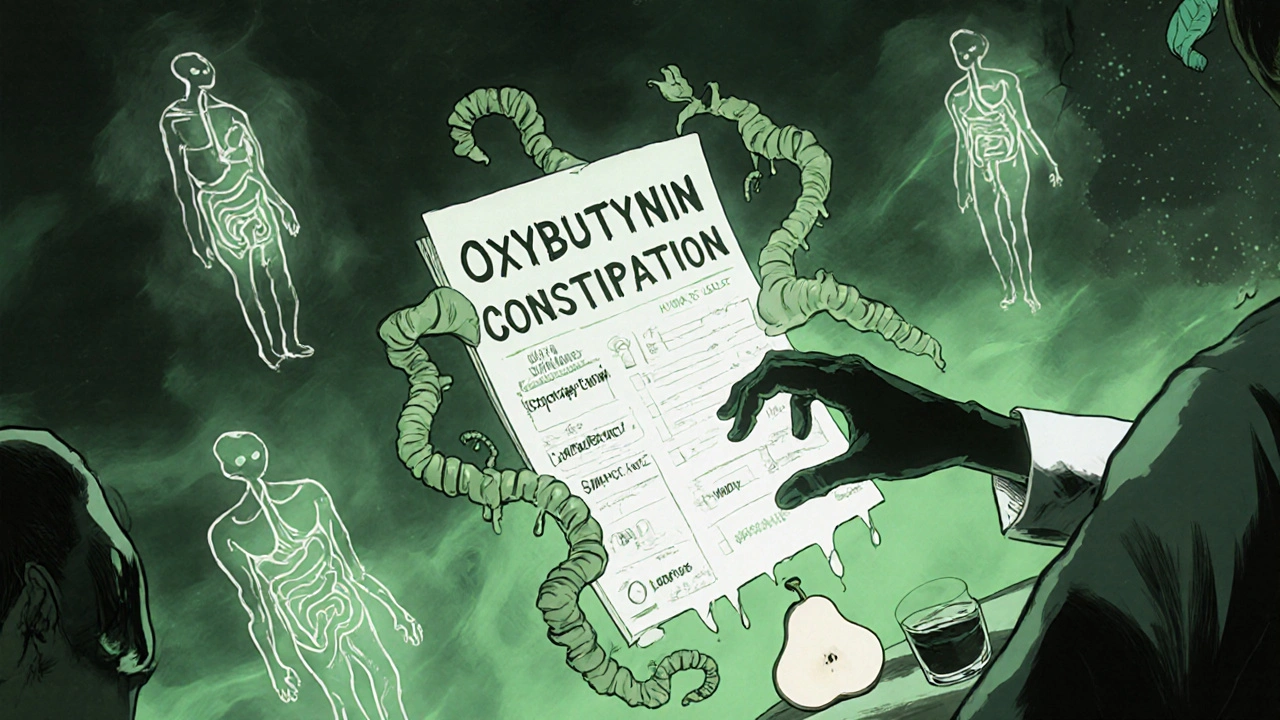If you’re taking oxybutynin for an overactive bladder, you’re probably familiar with the relief it brings-fewer bathroom trips, less urgency, more control. But for many people, that relief comes with a trade-off: constipation. It’s not rare. In fact, up to 20% of people on oxybutynin report trouble passing stool regularly. It’s not just uncomfortable-it can make you want to stop the medication altogether. The good news? You don’t have to live with it. There are real, practical ways to manage this side effect without giving up the benefits of the drug.
Why Oxybutynin Causes Constipation
Oxybutynin works by blocking acetylcholine, a chemical in your body that tells your bladder to contract. Less contraction means fewer sudden urges. But acetylcholine isn’t just in your bladder-it’s also active in your intestines, helping move food along. When oxybutynin blocks it there too, your gut slows down. Stool moves slower, water gets reabsorbed, and things get stuck. It’s not a bug-it’s a direct result of how the drug works. This is called an anticholinergic effect, and it’s one of the most common reasons people stop taking oxybutynin.
It’s not just about frequency. People often describe feeling bloated, full, or like they’re straining even when they know they need to go. Some notice their stools becoming hard, dry, or pellet-like. If you’ve had normal bowel habits before starting oxybutynin and now you’re going less than three times a week, that’s a clear sign the medication is affecting your digestive system.
First-Line Fixes: Diet and Hydration
Before reaching for laxatives or calling your doctor, start with the basics. You’d be surprised how often simple changes make a big difference.
- Drink more water. Aim for at least 8 cups a day. Water helps soften stool and keeps things moving. If you’re dehydrated, even fiber won’t help much.
- Eat more fiber. Soluble fiber (like oats, apples, beans) absorbs water and forms a gel that helps stool pass. Insoluble fiber (whole grains, vegetables, nuts) adds bulk. Try to get 25-30 grams a day. A single cup of cooked lentils gives you 15 grams. Add a pear or an apple with skin-it’s about 5 grams.
- Don’t skip meals. Eating triggers your gut’s natural movement, called the gastrocolic reflex. Skipping breakfast or lunch can slow things down even more.
One patient, Linda, 68, started taking oxybutynin and noticed she wasn’t going for four days. She added a banana and a bowl of oatmeal every morning, drank a full glass of water with each meal, and within a week, she was back to going daily. No pills needed.
Movement Matters-Even a Little
Your gut needs motion to work properly. Sitting all day makes constipation worse. You don’t need to run a marathon. Just walking helps.
- Take a 10-15 minute walk after meals. It’s been shown to speed up gastric emptying and colon transit.
- Try gentle yoga poses like seated twists or child’s pose. These can help stimulate bowel activity.
- If you’re less mobile, try ankle pumps or leg lifts while sitting. Even small movements can make a difference.
A 2023 study in the Journal of Urology followed 120 older adults on oxybutynin. Those who walked at least 30 minutes a day were 40% less likely to report severe constipation than those who didn’t move much. Movement isn’t optional-it’s part of the treatment plan.

When to Try Laxatives-And Which Ones Work Best
If diet and movement aren’t enough, it’s okay to use a laxative. But not all are created equal.
- Stool softeners (docusate sodium): These help moisture get into stool. Good for mild cases. Takes 1-3 days to work.
- Osmostic laxatives (polyethylene glycol, magnesium hydroxide): These pull water into the colon. Polyethylene glycol (Miralax) is often recommended because it’s gentle and doesn’t cause cramping. Works in 1-3 days.
- Stimulant laxatives (senna, bisacodyl): These force the colon to contract. Use only short-term. Can cause dependency if used daily for weeks.
- Avoid bulk-forming laxatives (psyllium) if you’re not drinking enough water. They can make constipation worse if you’re dehydrated.
Many doctors recommend starting with Miralax-one capful (17 grams) daily in water or juice. It’s non-habit forming and safe for long-term use in most people. If it doesn’t help after a week, talk to your provider about adjusting your oxybutynin dose or switching to a different medication.
Ask About Lower Doses or Extended-Release Forms
Not everyone needs the highest dose of oxybutynin. Many people start at 5 mg twice a day, but research shows that 2.5 mg twice a day often works just as well for bladder control-with fewer side effects.
There’s also an extended-release version (Ditropan XL) and a patch (Oxytrol). Both deliver the drug more slowly, which can reduce the intensity of side effects like constipation. A 2024 meta-analysis found that patients on the patch had 30% less constipation than those on the immediate-release tablet, while still controlling bladder symptoms equally well.
If you’re on the regular tablet, ask your doctor if switching to the patch or lowering your dose is an option. You might be surprised how much relief you get without the gut trouble.
When to Worry: Red Flags to Watch For
Constipation from oxybutynin is usually manageable. But some signs mean you need help right away:
- No bowel movement for more than 5 days
- Severe abdominal pain or bloating
- Vomiting or inability to pass gas
- Bloody stool
- Unexplained weight loss
These could point to a bowel obstruction or another condition. Don’t wait. Call your doctor or go to urgent care if you have any of these.

Alternatives to Oxybutynin
If constipation keeps happening despite your best efforts, it might be time to consider other medications. There are several options that target the bladder without hitting the gut as hard.
- Tolterodine (Detrol): Similar to oxybutynin but slightly more selective for the bladder. Less likely to cause constipation.
- Fesoterodine (Toviaz): A prodrug of tolterodine. Often better tolerated.
- Solifenacin (Vesicare): Also anticholinergic, but with lower rates of constipation in clinical trials.
- Mirabegron (Myrbetriq): Works differently-targets beta-3 receptors in the bladder. Doesn’t block acetylcholine, so constipation is rare. May cause high blood pressure, so it’s not for everyone.
One study comparing oxybutynin to mirabegron found that 18% of oxybutynin users stopped treatment due to constipation, while only 3% of mirabegron users did. If gut issues are your main problem, mirabegron could be a better fit.
Track Your Symptoms
Keep a simple log for a week: what you ate, how much water you drank, how often you went to the bathroom, and how you felt. Bring it to your next appointment. It helps your doctor see patterns and adjust your plan faster.
Apps like MyBowel or even a notebook work fine. You don’t need fancy tech. Just write down:
- Food and fluids
- Bowel movement frequency and consistency (use the Bristol Stool Chart if you’re unsure)
- Any discomfort or straining
- Whether you took a laxative
This turns guesswork into evidence-and gives you real power to talk to your doctor.
You’re Not Alone-And You Don’t Have to Suffer
Constipation from oxybutynin is common, but it’s not inevitable. Many people manage it successfully without quitting the drug. Start with water, fiber, and movement. If that’s not enough, talk to your doctor about lowering your dose, switching forms, or trying a different medication. Don’t let constipation steal your quality of life. You’ve already taken the hardest step-seeking help. Now it’s time to find the right solution for you.
Does oxybutynin always cause constipation?
No, not everyone gets constipation from oxybutynin. About 1 in 5 people experience it, but many others take it with no digestive issues. Risk is higher in older adults, people who are dehydrated, or those already prone to slow digestion. It’s not guaranteed, but it’s common enough that you should plan for it.
Can I stop taking oxybutynin if constipation gets bad?
Don’t stop suddenly without talking to your doctor. Stopping abruptly can cause your bladder symptoms to come back worse. Instead, work with your provider to adjust your dose, switch to a different form (like the patch), or try a different medication. There are options that work just as well with fewer side effects.
How long does constipation last after starting oxybutynin?
For many, it starts within the first week and can improve over time as the body adjusts. But if it doesn’t get better after 2-3 weeks with lifestyle changes, it’s unlikely to resolve on its own. That’s when you should consider a dose change or alternative medication.
Is Miralax safe to use long-term with oxybutynin?
Yes. Polyethylene glycol (Miralax) is considered safe for long-term use in most adults. It doesn’t cause dependency or damage the colon. Many people take it daily for months or even years while on oxybutynin. Always follow the recommended dose and drink plenty of water with it.
Are there natural remedies that help?
Prune juice, kiwi, flaxseed, and chia seeds can help. Prunes contain sorbitol, a natural laxative. Two to three prunes a day or 4 ounces of prune juice can be effective. Flaxseed (1-2 tablespoons ground) adds fiber and omega-3s. But natural doesn’t mean risk-free-some herbs can interact with medications. Always check with your doctor before starting supplements.
Next steps: Start with one change today-drink an extra glass of water, add a serving of fiber, or take a 10-minute walk after dinner. Track your progress. In a week, you’ll know if it’s working. If not, schedule a call with your provider. You’ve got options-and you deserve relief from both your bladder and your bowels.


Mickey Murray
October 29, 2025 AT 05:53Let me get this straight-you’re telling me people are surprised their guts slow down when you block acetylcholine? Like, did anyone actually read the drug’s mechanism before popping pills? This isn’t rocket science, it’s basic pharmacology. You want bladder control? Cool. But your colon’s not a VIP section-it’s not getting a pass because you’re ‘suffering.’ Stop acting like this is some tragic mystery. Fix your water intake, eat fiber like your life depends on it, or stop complaining. Simple.
Kevin McAllister
October 29, 2025 AT 09:40You know what this really is? A metaphysical failure of modern medicine-where we pharmacologically silence symptoms instead of restoring balance. Oxybutynin doesn’t ‘cause’ constipation-it exposes our collective abandonment of natural rhythm. We’ve outsourced digestion to pills, then blame the pill when our bodies scream back. The real tragedy? We’ve forgotten that the gut is a sovereign organ-not a side effect to be managed with Miralax. Wake up. Your colon remembers how to work. You just forgot to listen.
Marcia Martins
October 29, 2025 AT 15:36I just wanted to say thank you for writing this. I’ve been on oxybutynin for 8 months and was about to quit until I read the part about the patch. I switched last week and honestly? Life changed. No more bloating, no more panic before leaving the house. I’m crying a little typing this. 🥹 Also, the 10-min walk after dinner? I do it with my dog and now we both poop better. 🐶❤️
Robert Bowser
October 30, 2025 AT 13:02I appreciate the practical advice here. The breakdown of laxative types was actually super helpful-I’ve been using senna for months thinking it was fine. Didn’t realize it could cause dependency. Going to try Miralax tomorrow. Also, the Bristol Stool Chart suggestion? I’m printing that out. Never knew there was a scientific way to describe poop. Thanks for making this less awkward.
Sue M
October 31, 2025 AT 19:19Correction: The study cited in the Journal of Urology was a 2022 longitudinal cohort, not 2023. Also, ‘pellet-like’ stools are classified as Type 1 on the Bristol Scale-not ‘hard and dry,’ which is vague. Precision matters. And ‘drink 8 cups a day’? That’s outdated. The Institute of Medicine recommends 3.7L for men, 2.7L for women-including water from food. You’re underestimating hydration needs. Fix the facts before you fix people’s bowels.
Rachel Harrison
November 2, 2025 AT 06:02Prune juice + flaxseed + Miralax = my holy trinity. 😌 I’ve been on oxybutynin for 3 years. Started with 5mg twice a day, now I’m on 2.5mg + the patch. Total game changer. Also, if you’re not eating lentils, you’re doing it wrong. One cup = 15g fiber. That’s like 3 apples. Easy. And yeah, walking after meals? Non-negotiable. I even do it while on Zoom calls now. Nobody knows I’m pacing. 🤫
Tiffanie Doyle
November 3, 2025 AT 09:15omg yes yes yes!! i switched to mirabegron last month and my gut finally chillllled out 😭 i was so scared to change meds but my dr was like ‘you’re not failing, the drug just sucks for you’ and i was like… thank you for saying that. also i started eating kiwi every morning and it’s like magic. not even joking. my dog even looks at me different now like ‘who are you and why are you so happy’ 🐶💕
james landon
November 3, 2025 AT 10:28Bro. I’ve been on this med for a year. I didn’t even know constipation was a side effect. Thought I was just lazy. Now I’m like… oh. So I’m not a weirdo? Cool. Thanks for the walk tip. I’ll try it. Maybe. If I feel like it. 😅
Jenn Clark
November 3, 2025 AT 11:40I’m from the UK and we don’t have Miralax here-it’s called Laxido. Same thing. Also, the patch is called Oxytrol over here too. Just wanted to say this advice works globally. I’ve shared this with my mom in Scotland and she’s already on the patch. Small changes, big relief. Thank you for writing this with so much care.
L Walker
November 4, 2025 AT 17:08Interesting piece. But I’d add one thing: don’t underestimate the role of circadian rhythm. Your gut has a clock. Taking oxybutynin at night instead of morning can reduce its impact on digestion. I’ve seen it in my practice. Also, magnesium glycinate-100mg at bedtime-helps more than people think. It’s not a laxative, it’s a muscle relaxant for the colon. Try it before you hit the Miralax. And yes, prune juice works. But it’s not ‘natural’-it’s just sugar with fiber. Don’t romanticize it.